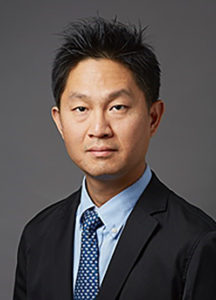
Tae Kon Kim, M.D., Ph.D.
Assistant Professor of Medicine
The major focus of the Kim Laboratory includes:
1. Overcoming immune evasion in leukemia: Recently, immune checkpoint blockades, including anti-programmed cell death protein 1 (PD-1) therapy, have shown unprecedented clinical efficacy in some solid tumors. However, the response rate to immune checkpoint blockades in myeloid leukemia has been disappointing. The failure of anti-PD-1 therapy in myeloid leukemia suggests that immune evasion in A myeloid leukemia may be attributed to the expression of unique co-inhibitory molecules outside the PD-1–PD ligand 1 (PD-L1) axis. We are investigating to find novel relevant co-inhibitory molecules besides PD-1¬–PD-L1 in human myeloid leukemia and study the role of those co-inhibitory molecules in mouse models including humanized mice.
2. Dissect graft-versus-host disease and graft-versus-leukemia in allogeneic stem cell transplantation (allo-SCT) by manipulating co-inhibitory molecules: Allo-SCT represented the earliest successful immunotherapeutic strategy in AML, employing graft-versus-leukemia (GVL; the attack of donor-derived T cells on leukemic cells). But GVL treatment is generally accompanied by the increased risk of graft-versus-host disease (GVHD; the attack of healthy recipient tissues by donor T cells), as both GVL and GVHD are caused by similar allogeneic T cell responses. In addition, our current immunosuppressive strategies (e.g., corticosteroids) are indiscriminate, so we cannot selectively inhibit GVHD while maintaining GVL effects. Non-selective pharmacologic inhibition can increase the risk of opportunistic infections due to delayed immune reconstitution and may mitigate GVL effects. To overcome this issue, selective inhibition of allo-reactive T cells to suppress GVHD while maintaining GVL and pathogen-specific immunity has been investigated. We are investigating strategies to selectively inhibit GVHD with sparing GVL in allo-SCT by manipulating co-inhibitory molecules.
3. Human correlative studies in line with clinical trials: we participate in human correlative studies with samples from patients in clinical trials. Typically we perform a CyTOF, a multi-color flow cytometry, a multiplex immunofluorescence, ex vivo T cell suppression/activation assay.